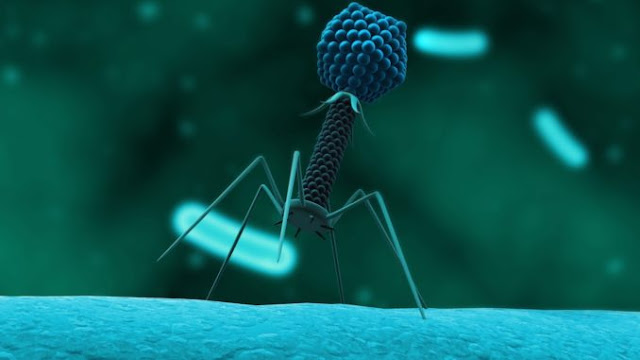war in the micro world (Bacteriophages Vs Superbugs)
In early days, bacteria were dangerous beings that hunted us mercilessly before antibiotics were found. But now, we found a solution naturally. By accident, we found fungi, that produced compounds and killed bacteria, known as antibiotics. We got a powerful super weapon. Antibiotics were so effective that we stopped thinking of bacteria as very dangerous one. Only the old and the weakest among us are killed by them. We used antibiotics more and more for less and less serious causes. But bacteria are living things that evolve and one by one they become resistant to antibiotics also. This continued until the evolution of what are called 'superbugs'. Bacteria has a capacity to be immune towards almost every antibiotics we have. This immunity is spreading across the world. By 2050, superbugs can kill more humans than cancer in a year. Those days are coming, when a cut or bladder infection or a cough could kill humans. In US alone, more than 23,000 people die from bacterial diseases each year, which are resistant to antibiotics. Bacteriophage
Bacteriophage or 'phage' for short. A phage is a virus; not quite alive, not quite dead. Their head is icosahedral with 20 faces and 30 edges. It contains genetic material of the virus and often sits on a long tail that has leg-like fibers. There are more phages on earth than any other organism, including bacteria. Phages are responsible for the majority deaths of bacteria on earth, they only kill bacteria. Up to 40% of bacteria in the oceans are killed by them every single day. But phages also have major flaws. Like any other virus, phages need a host to survive and reproduce. They're not much more than genetic material in a hull and are specialized. Usually, a phage chooses one specific bacteria and some may be closely related.
 Phages attacking bacteria
Phages attacking bacteria
When a phage finds its victim, it connects its tail fibers with receptors and uses a sort of syringe to puncture a surface. The phage squeezes its tail and injects its genetic information. Within minutes, the bacteria are taken over, which is now forced to manufacture all the parts of new phages. They only stop when the bacteria are filled up with brand-new phages. In the final step, they produce 'endolysin', a powerful enzyme that punches a hole in the bacteria. The pressure is so high that the bacteria vomits out everything present inside and dies. New phages are released and begin a new cycle.
But in turn, phages could save us. We can inject them into our bodies to help cure infections.
Question rises, how could injecting millions of viruses into
an infection be a good idea? Phages are very very specialized killers of
bacteria. So specialized, that humans are completely immune to them;
we are too different that we encounter billions of phages every day.
Pseudomonas aeruginosa
If we use phages to kill bacteria, won't bacteria develop ways to defend themselves? Well, phages evolve too. There had been a race between bacteriophage and bacteria for billions of years, and so far, they're doing great. This makes phages smart weapons that are constantly getting better at killing bacteria. Even if the bacteria were to become immune against phage, we still might be able to win. It turns out, that in order to become resistant to even just a few species of phages, bacteria has to give up their resistance to antibiotics. We might be able to trap them in a antibiotics. This has already been successfully tested with a patient who had no other hope left. The bacteria 'Pseudomonas aeruginosa', one of the most frightening bacteria, infected the mans chest cavity. They are naturally resistant to most antibiotics and can even survive an alcoholic hand gel. After years of suffering, a few thousand phages were directly inserted into his chest cavity together with antibiotics for which the bacteria were immune to. After a few weeks, the infections had completely cured. This treatment is still experimental and has no official approval yet. In 2016, the largest phage clinical trial began.
-Ramnath P





You are focussed only on a single topic ! Our body has good bacteria also which are essential for our growth ,imune system as well !! By killing the harmful bacteria you're destroying the good once also which isn't that good idea !! By doing this we weakening the our immune system !!
ReplyDeleteNo actually the bacteriophage are like targeted missiles they only kill the bacteria which you say to kill depending on strains of bacteriophage selected
DeleteBut I heard that when we take antibiotics it kills all the bacterias present
DeleteIn my article I have implemented the use of bacteriophage. Yes antibiotics kill all kind of bacteria that's why we have the supplement are available like enterogermina by cipla company which helps to restore gut bacteria
DeleteI see 👍 thank you for the replies
DeleteAnd bacteriophage is so different from antibiotics they don't kill all bacteria they are specific
DeleteBacteriophage is a virus which replicates . The concern of my quiry was only related to antibiotics 😅.
DeleteYea I got your query . Antibiotics do kill all the bacteria which are present . Nothing can be done antibiotics are not targeted but the gut bacteria (good bacteria) they do have some little resistance towards antibiotics .
Delete